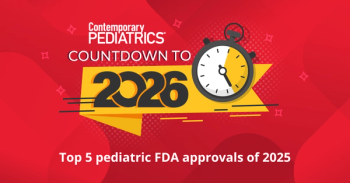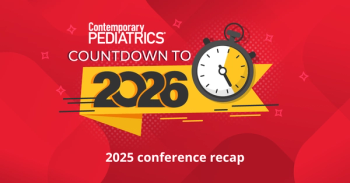
PODCAST: Testing for substance abuse
Sharon Levy, MD, MPH, FAAP discusses the clinical report "Testing for drugs of abuse in children and adolescents" with Contemporary Pediatrics.
Sharon Levy, MD, MPH, FAAP discusses the clinical report "Testing for drugs of abuse in children and adolescents" with Contemporary Pediatrics.
NEXT: Transcript
Karen Donley-Hayes: This is Karen Donley-Hayes for Contemporary Pediatrics. Today we’re speaking about pediatric drug testing with Dr. Sharon Levy who is medical director of the Adolescents Substance Abuse Program at Boston Children’s Hospital and assistant professor of Pediatrics at Harvard Medical School. Thank you for joining us, Dr. Levy.
Dr. Levy: Oh, thank you.
Ms Donley-Hayes: Dr. Levy, it seems to me that there must be a real balancing act in tackling this subject, from assessing and counseling the patient and his or her parents, to ensuring patient confidentiality, to building mutual respect and rapport. With regard to marijuana testing specifically, how can the community pediatrician best manage all of these variables to effectively engage the patient and counsel concerned parents?
Dr. Levy: Well, that’s a good question, and obviously it’s a big topic, but I would encourage community pediatricians to start by thinking what the purpose of the test is. And we certainly do that for every laboratory test we send. Testing for marijuana can really be used for 2 purposes in community pediatric settings. One would be to establish whether or not an adolescent patient has used marijuana recently. Now it’s usually not necessary to do a laboratory test for that. Usually the best way to get that information is by doing a careful history, and if the adolescent already reports marijuana use then the laboratory test would add little. There may be some situations in which a parent or another adult believes an adolescent’s been using marijuana and the adolescent’s history doesn’t match that. And so in that case it might be a good thing to do to submit a urine test, which could establish or could support, at least, a history of no use.
Ms Donley-Hayes: Or vice versa.
Dr. Levy: Or vice versa, or really to open an honest conversation. If, in fact, the adolescent has used marijuana or has been using it, what’s really tricky about it is that whether you’re going to find a positive drug test depends on how heavily or how regularly the patient has been using in combination with the labs. So an adolescent who uses very sporadically, it’s going to be very hard to get a positive test with just a random test. So I think it’s an important point that most folks think that marijuana will stay in their system for 4 weeks or 6 weeks or 2 months, and the reality is that for sporadic users marijuana is usually cleared in 2 or 3 days, just like most other substances, so it can be really hard to detect. But for regular chronic users, they’ll have a positive test for some time. And so if the suspicion is that an adolescent has been smoking marijuana fairly regularly and is denying use, then a test could really establish that.
Ms Donley-Hayes: Okay. You’ve sort of already answered this a little bit, but in your own experience with your patients and their parents, what approach have you found that seems to work best? I mean, do you have a fair confidence that you’re eliciting an accurate and honest history from the adolescent patient?
Dr. Levy: You know, I think that if you have a private conversation with an adolescent and you conduct an interview, my experience is that you get a lot of history. Now that isn’t to say that no adolescent has ever lied to their physician or not reported something that they’ve done. Recognizing the history has its limitations, as does drug testing, right, so both of them have pros and cons, and there are cases where it makes sense to use them together and there are cases where it makes sense to use one rather than the other. What I would say is that I think that more often than not we can get an honest history. Usually, by the time a parent comes in and says “I’m really worried about my kid using marijuana,” that’s because they’ve already caught them. So they know that there’s been use, right? So even in the case of an adolescent denying, it’s questionable what you would do if the test came back negative, right? I mean, if a parent actually caught an adolescent using marijuana, that’s really the piece of history that’s going to override almost anything else that happens. So that’s why I’m saying you have to be really thoughtful about what does the information mean and how are you going to use it. You know, how I think it could be really useful is as part of a treatment plan. So for an adolescent who has been identified as somebody with problematic use or a marijuana use disorder, whom you’re working with, who has agreed to make a behavior change, then in that case drug testing can be a real asset because it’s a way to monitor progress and follow up. We’re talking just like a scale is a good tool for somebody who’s dieting.
Ms Donley-Hayes: Right. Or in this case, but a scale you can throw out or not look at if you don’t want to see what it says. It’s obviously a delicate and potentially volatile topic, not only the testing for pediatric drug abuse but the entire issue of medical marijuana. What concerns, if any, do you have about the growing movement for legislation of medical marijuana in some states as a first step toward legalization of its recreational use?
Dr. Levy: Well, I do have big concerns about that. You know, I think that the cannabinoids, those are the active ingredients in marijuana, can really be made into pharmaceutical products that belong in the pharmacopoeia. They’re going to have a lot of, I believe that there are going to be indications for them and they’re going to make good medications. I don’t think it’s a good idea to dispense cannabinoids in the form of marijuana. I don’t think that we should be smoking any medication. We know how harmful smoking is, smoking anything, and that’s because the products of combustion are just so toxic to the lungs that it’s hard to imagine that it’s a good idea to smoke any medication. So I think that we should be making sure that the formulation is really appropriate, and cigarettes just don’t cut it in my book.
Ms Donley-Hayes: So find another medium of delivery.
Dr. Levy: That’s right, and the other thing that goes along with it, it’s not necessarily part and parcel of using cannabinoids as a medication, but the way it’s unfolding is that as we’ve moved toward treating marijuana as medication, essentially what we’ve done is we’ve deregulated it far beyond any other medication. So now this is, I use the term “medication” loosely but it’s something that’s not prescribed, it’s recommended, we don’t give the dose or the timing that somebody should take it with, right, we just leave patients kind of on their own to figure that out and we distribute it through these medical marijuana dispensaries which are essentially just businesses that sell only 1 product. I think that it varies a bit state by state who is running these, but in Massachusetts where I practice the only qualifications you need to open a licensed medical marijuana dispensary are that you need to be a high school graduate and you can’t have a record of having committed or being convicted of a felony. So very deregulated, I mean when you compare that to what a pharmacist is, and so those 2 things don’t necessarily need to go together but in practice they’re going together, and I find this very, very concerning.
Ms Donley-Hayes: Well, it’s a slippery slope and there are a lot of people weighing in on a lot of different aspects of it. Thank you so much, Dr. Levy, for weighing in on this complex topic. There’s so much to say about it-a lot more than we can cover in this little podcast-but I do want to thank you very much for your time and participation.
Dr. Levy: My pleasure, thank you.
Ms Donley-Hayes: You’re welcome. And this has been Karen Donley-Hayes for Contemporary Pediatrics.
Newsletter
Access practical, evidence-based guidance to support better care for our youngest patients. Join our email list for the latest clinical updates.








